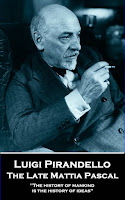 |
| (Amazon UK link) |
The novel is told in the first person, sometimes in quite a disjointed way, by Mattia Pascal. He tells us right at the beginning that he has already died twice, and that he’s going to tell his story. He’s working in a church, we learn, and his colleague is the one who wants him to write about his rather unusual life.
The first few chapters are a bit confusing, letting us know his current circumstances, and with a great deal of rambling. I quite liked the style, speaking directly to a reader, with conversational breaks here and there. But I did wonder when the story was really going to start…
Eventually the story begins, giving us some background to Mattia’s life. He was born in a prosperous family, but unfortunately his father died when he was just four years old. His mother was quite nervous, and put all her trust in a family friend who turned out to be a cheat. He gradually acquired the family property and money, but pretended to be helping them.
So Mattia is struggling to survive, when he falls in love. He manages to get a job, but then his potential bride marries someone else. He’s devastated, but meets another woman whom he marries. All might have gone well, but his wife’s mother moves in too. She’s overbearing and dominates everyone. Mattia gets more and more depressed, and one thing that brings him joy ends in tragedy.
He’s thoroughly fed up, and decides to travel somewhere random for a few days, where he manages to win a great deal of money gambling. And then, on his way back home, he reads in a newspaper that he has been declared dead. A body was found in the local river, and somehow determined to be Mattia Pascal. And instead of returning to disabuse his family and friends of this, Mattia decides that he will adopt a different personality and name. He believes he will be happier free of his debtors (and his mother-in-law) and he has plenty of money to live on for some years.
Much of the book follows Mattia’s life as Adriano Meis living in Rome. And it’s cleverly done. The initial sense of freedom gradually erodes as he realises just how limited he is, without any documentation proving who he is. I was a little surprised that this was the case a hundred and twenty years ago. But he can’t buy a house, he can’t get a job, he can’t get married again… and when people ask awkward questions, he has to invent a past for himself that can’t be checked or refuted.
The style is unusual, but it works well. I assume the translation is faithful to the original, as it’s very readable with some ironies and low-key humour here and there. There’s also rather a lot of philosophical and other discussion with people Mattia/Adriano meet, and I have to admit to skimming quite a bit of that. The middle of the book does feel a tad long-winded in places, but it makes the point brilliantly. Starting a new life as an adult, free of previous encumbrances, does not necessarily mean freedom or happiness.
The pace increases somewhat towards the end, as Mattia decides to do something radical, not thinking about what might happen, or what the repercussions might be. It’s cleverly done, and I liked the final chapters very much. The people are surprisingly modern in many respects, and come across as three dimensional and believable.
I was expecting more insights into Italian culture at the start of the 20th century, but the novel is character-based, and I’m not sure I learned anything much about the era, or even the culture. Perhaps it was deliberately written so as to be somewhat timeless and free of too much social history.
I doubt if I’ll read this again, but I would recommend it if you would like something rather different to read.
No comments:
Post a Comment